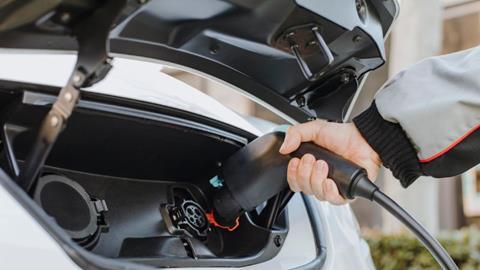Public EV chargers being used by Allstar business customers rocketed by 264% in Q1 2024, compared to the same period last year, with corporates leading the way.
The findings come from a new report from Allstar, the EV, fuel and business expense payment firm.
The second edition of Allstar’s report AllCosts has crunched data for millions of transactions across the Allstar fuel card network and hundreds of thousands of charging sessions in public and at home between January and March 2024.
The report found that corporate fleets are at the forefront of electrification and are using far more public charging and home charging, with 36% of AllStar’s corporate drivers now carrying a card for charging in public, while 21% also charge at home.
However the use of home charging is “considerably lower” among small and medium sized businesses, with only around 7-8 % of companies in this sector using home charging, according to the data.
The research also revealed that public EV chargers being used by Allstar customers is up by 264% - more than twice as much as the same period 12 months ago. Similarly, the use of home charging by electric business drivers has leapt by 113%.
The cost of home charging has stayed level, the report found, despite the volatility in energy prices over the last few years, with the average tariff remaining the same as the previous three months at an average of 28p per kWh.
This is what consumers would expect to pay as an average domestic energy user based on the OFGEM price cap at the time. This quarter the highest recorded cost was 50p per kWh and the lowest was 5p.
The report commented: ”Certainly, the cost and practical benefits of charging at home are yet to be unlocked by many businesses,especially with over 70% of vehicle owners surveyed by a government study having access to a private space such as a driveway or garage.”
It also found that public chargers have become more expensive, with drivers paying to recharge on the road on average 82p per kWh, an increase of 12p from the previous quarter of October-December 2023.
The highest recorded cost was £1.06, while the lowest was 54p. The figures are based on what was paid for real-world charges, not the average price of each provider.
The report notes: ”While there have been some unit cost increases from previously lower price providers, 82p is similar to what many premium, high speed charge point operators have been charging for some time, so drivers are increasingly opting for premium charging to get back on the road quicker.”
According to the report, the price of petrol and diesel is slowly falling, with petrol prices at the pump down 7.26p to an average 143.34p and diesel down 6.1p to 158.5p.
After a rise over the first part of the winter, diesel prices have returned to levels seen in summer 2023. The price of Brent Crude oil has been steadily falling since early 2022; as supply and demand balance each other out, the forecast is for stability throughout the rest of 2024 and maybe even 2025.
The report also found that, on average, all fleets of all types and sizes are spending around 4% of their overall fuel budget on electric, compared to an average spend of around 1% on electric a year ago.
Ashley Tate, Allstar Chargepass UK MD, said: “The AllCosts report paints an interesting picture of the needs and wants of business drivers across the UK.
”Despite some having the perception that there are not enough chargers around the region, or a lack of accessibility, public charger use is up more than twice as much as the same time 12 months ago. We know that EV adoption has slowed in some areas, but businesses continue to turn to electric vehicles for their fleet operations.
He added: “It is also important to look at the type of charging that the report represents, with recharging being significantly cheaper to do at home. But for those that are out and about and need to plug in, it seems that drivers and their businesses are happy to pay more if charging speeds are faster and downtime is minimised.”
Paul Holland, MD of UK/ANZ Fleet at Corpay, including UK brand Allstar, said: “It is positive to see the price of both petrol and diesel falling, and this should continue into 2025.
“Interestingly, despite a generally low cost, there was quite a significant disparity between the lowest and highest prices for diesel that equate to more than £15 for filling up a 70-litre tank.
”This demonstrates that even when things are looking better it is still important to shop around to ensure drivers are accessing the best prices and reducing the costs for their businesses.”

















